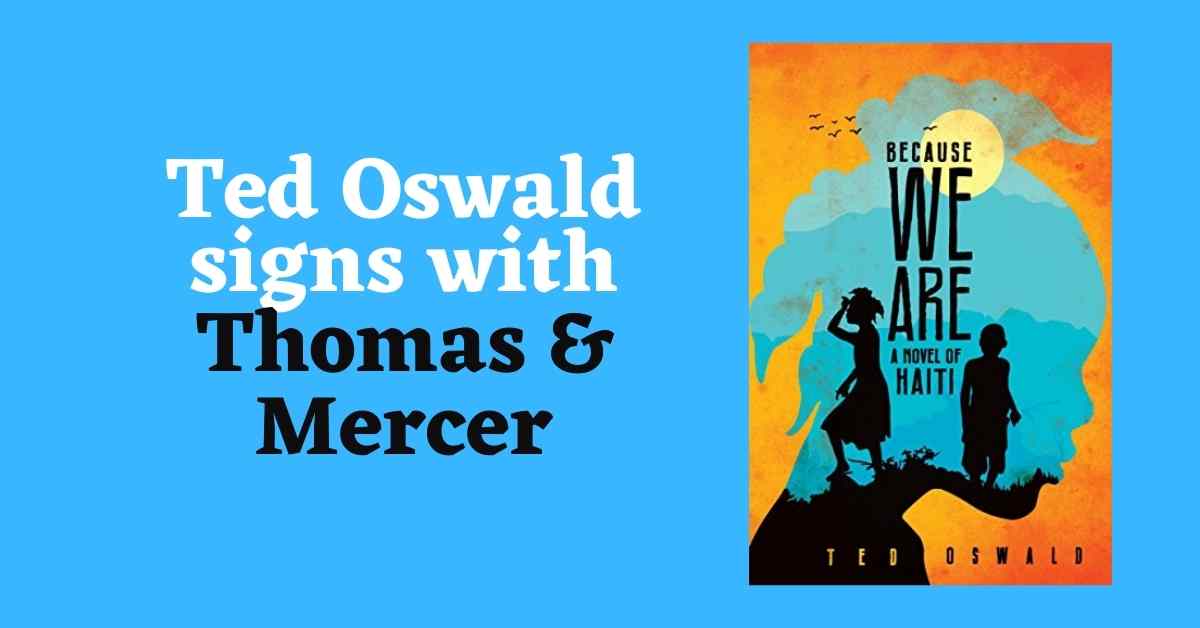Back in April, I stumbled across a wonderful novel called Because We Are: A Novel of Haiti by Ted Oswald. I think I was only half-way through when I started hunting him down on the internet to tell him how much I liked it.
I don’t usually chase people across cyberspace to give them a review, but this was a remarkable book. I also knew that once you guys heard the backstory you would want to know more. After a little cajoling, Ted agreed to be interviewed…
David Gaughran: For those who haven’t had the pleasure of reading Because We Are, perhaps you could kick off by telling us a little about the story and how you came to write it.
Ted Oswald: Sure thing. In short, it’s a literary murder mystery set against the backdrop of modern-day Haiti. But I think it’s a good deal more than that would suggest. I’ll share the book’s trailer since it fills in a lot of the backstory.
For those unable to watch, in 2010, I was a law student and interned in Haiti months after the earthquake. The story is set in the community in which I worked, a notorious slum called Cité Soleil. It follows two unlikely detectives—children, brash Libète and brilliant Jak—as they try to solve the mystery behind a murdered mother and her infant child. But more than that, it’s a story about bigger themes: friendship, the struggle for justice in the face of impunity, sacrifice for the community, personal responsibility, faith and doubt in light of tragedy, and the foolishness of scarcity in a world of plenty.
That might actually be the first good book trailer I’ve seen. But I want to talk about something else. This blog focuses on authors trying to make a living from self-publishing. You take a very different approach. All profits from Because We Are go to a series of NGOs. Tell us a little about that decision.
Because my day job as a legal aid lawyer pays the bills, I was freed to pursue this idea of publishing a “nonprofit novel” where net proceeds are donated to a number of organizations working in Haiti that I respect. It’s sometimes hard to find the extra resources to give to causes I care about, and I thought that writing a book that would allow me–and by extension those who purchase the book–to support vital work was an exciting concept. I admire examples of generosity spurring generosity, and I thought this was an interesting way to tie readers into the book’s special context and themes.
You also ran a crowdfunding campaign to cover the publication costs. How did that go?
It went really well. I was exploring traditional publishing when I finished the manuscript and, thanks to blogs like this one, ended up climbing down the rabbit hole and emerging in this wonderful, shifting landscape of self-publishing. I wanted my book to be birthed before too long because of the current events it deals with, and I wanted to see it shared with others. Pursuing a longshot traditional publishing deal wouldn’t guarantee either of those. So I decided to crowdfund the book and launched a campaign on Indiegogo (you can check it out here).
Hardly any friends or family members knew that I’d been writing a novel in the prior year-and-a-half, and so when I announced it with this fully-formed campaign and video, a lot of them were excited to support me and the book. The fact that extra proceeds were donated to great organizations helped others I’d never met commit to the campaign. It was a great way to move a lot of copies without having a pre-established authorial platform.
I’ve since loved the DIY process of self-publishing. Building my own website, writing my own blurb, learning Adobe InDesign, principles of book layout, social media, scripting videos, and assembling a team of friends to do the things I couldn’t, namely editing and cover design. Time-consuming? Yes. But thrilling? Also yes.
The subject matter of this book is quite close to my heart. I’ve worked for NGOs and traveled extensively in Latin America. One thing that jumped out at me was your portrayal of how institutions have failed the poor of Haiti, whether that’s the local police, the politicians, the UN, or even the large aid organizations. Regarding the latter two, this is something I saw first-hand in Thailand after the tsunami, in Kosovo after the war, and in the shanty towns of Peru. From what I saw, the local grassroots NGOs were invariably more effective in making a difference on the ground. Could you explain a little more about that in the context of Haiti?
I didn’t know you had those experiences! Because We Are does highlight some of the complexities of foreign aid and intervention.
Many are passively familiar with Haiti’s travails. The legacy of slavery, rapacious leaders, political instability, endemic poverty and natural and manmade disasters makes for an incredibly complicated context.
Injected into that mix are literally thousands of foreign NGOs operating on Haiti’s soil. The humanitarian impulse to relieve suffering is a good one, but good intentions, inexperience, and a rush to see results can hurt more than help. For NGOs to have a lasting, positive impact in areas like public health or economic development, they need to do the hard, long work of listening well and building relationships marked by trust, respect, and fairness. Grassroots NGOs are often run by Haitians, or have significant Haitian leadership, and the importance of this can’t be understated. In my limited experience, organizations of this type have the best chance of seeing their work strengthen communities and result in positive outcomes.
I’d like to move on and talk about the style of the book. It’s ostensibly a murder mystery, albeit one with an exotic setting, but the style is very literary. There is a particular device you employ which is quite unusual. For those who haven’t read it, this story isn’t told in a strictly linear fashion. The narrative jumps all over the place – not just back-and-forth from two fixed points in the timeline. It makes for a fascinating read, but another aspect of this device is that after each narrative switch the following scene opens in present tense, continues like that for a paragraph or two, then switches back to past tense. At first I was wondering if it was an error, or whether I had missed something, but then I realized that perhaps the point of the sections in present tense was to ground the reader in the narrative, to say to the reader YOU ARE HERE before continuing with the story. Was that the intention?
Absolutely. I have to confess two influences that might contextualize the time jumps and tense shifts. I love Cry, the Beloved Country and the TV series Lost. These both shaped the story’s style and storytelling sensibility. Alan Paton (the author of Cry) used these interesting tense shifts in the middle of scenes or between scenes. It was beautifully inconsistent, defied convention, and created a real sense of significance when a shift occurred. Now, if you watched Lost, there was this great sound effect that would indicate a change in time between scenes, and the tense-shift for me was an attempt to be that sound, grounding the reader in the new moment and setting. I also tried to give a subtle visual cue to help navigate the time jumps, in that the protagonist’s small silhouette shifts direction based on whether the scene is a flashback or set in the present.
And what are your influences in a general sense? What do you like to read?
Consuming Edwidge Danticat’s work was a prerequisite to writing this; other specific influences (besides Alan Paton’s oeuvre) include Dave Egger’s What is the What and more light-hearted fare like the No. 1 Ladies Detective Agency series. I’ve been really taken with some classic Graham Greene novels as of late, and am catching up on more contemporary lit fic that fell by the wayside during my legal studies. Probably not a surprise, but I also appreciate a lot of nonfiction centered on Haiti; I just cracked Farewell, Fred Voodoo by Amy Wilentz last night and can tell it’s going to be great.

I’d love to talk more but we have to wrap things up. Before you go, do you have any more adventures planned for Libète and Jak?
Those two have been on my mind as of late! I’ve published two other short mysteries set prior to Because We Are that follow the two children, and each is a breezy little story that I think anyone who enjoys the full-length novel will also appreciate. They’re entitled The Bloodied Birds and The Kings of Nothing. I’ve also been diligently plotting a story arc that would carry them through two more novels, but we’ll see if those come to pass!
I haven’t read the shorts yet, but they are both on my Kindle. And I’m especially looking forward to more novels. Thanks for taking the time to be interviewed.
David, thanks so much for this opportunity to share my story with your community here, and for your other support along the way. I’m glad Because We Are resonated with you and hope it might connect with others! If it does, I’d love for them to drop me a line at ted.oswald [at] becauseweare.com.
Final Note From Dave:
Ted’s email is above if you want to get in touch, and you can read more about the Haitian NGOs that benefit from the proceeds on the book’s website.
If you are looking for something great to read, that also supports a wonderful cause, buy your own copy of Because We Are from Amazon – available in paperback or ebook and audiobook as well. And if you need further convincing, read my five star review here.
Update:
Ted Oswald has been signed by Amazon’s Thomas & Mercer imprint. Read the good news here.



